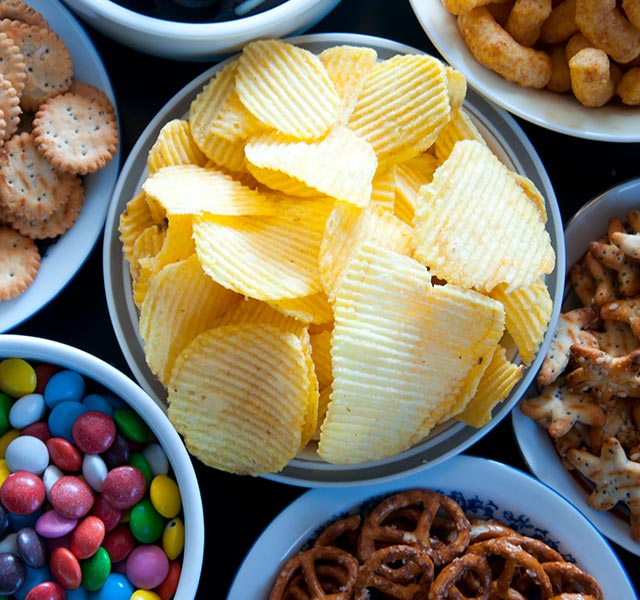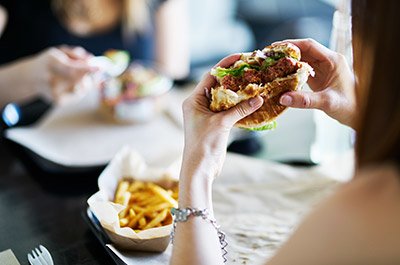Americans’ busy lifestyle—coupled with our desire for tasty foods—has created a spike in our consumption of ultra-processed foods over the past two decades. Research suggests that between 60% and 90% of the standard American diet now consists of foods and beverages that are highly processed.
“Unfortunately, the more processing a food goes through, the more vitamins, minerals and fiber are lost during processing,” says Sarah Hutchinson, R.D., a registered dietitian at Henry Ford Health.
In many cases, processing not only strips foods of nutrients, it also adds preservatives, sodium and other unhealthy ingredients.
What Are Ultra-Processed Foods?
Anything that comes in a package is processed to some degree. But ultra-processed foods involve several processing steps and include multiple ingredients like preservatives, gums, fillers, flavors and other substances like sugars, salt and fats. They are also sometimes called highly processed foods.
“The term ‘ultra-processed’ applies to foods that are processed and include a manmade manufacturing component,” says Hutchinson. “So something like sugar from sugar beets is processed. But when that same sugar is used in a manmade food like soda, it becomes ultra-processed.”

Meet With A Dietitian
Examples include:
- Certain breakfast cereals
- Cookies
- Crackers
- Frozen dinners
- Fruit-flavored yogurts
- Processed lunch meats
- Soda
Studies show eating ultra-processed foods increases the risk of developing—and dying from—cancer (especially ovarian cancer). “And there’s a strong link between eating processed foods and an increased risk of conditions like high cholesterol, heart disease and diabetes,” Hutchinson says.
Highly Processed “Health Foods”
Unfortunately, “junk” foods aren’t the only culprits when it comes to ultra-processing. Foods that are marketed to vegans, vegetarians and people following a gluten-free diet—including almond milk, alternative meat products and bakery items—are often full of gums, fillers, preservatives and other ingredients.
According to Hutchison, even a standard protein bar is problematic. “A granola bar with nuts, honey, granola and oil is slightly processed. A protein bar with mashed-up protein and 20 to 30 other ingredients is ultra-processed,” she explains.
Take Steps To A Less Processed Diet
Processing isn’t all bad. After all, cooking, rinsing and even cutting are types of processing—and that type of processing can impart health benefits.
Cooked tomatoes, for example, boast more of the cancer-fighting compound lycopene than their raw counterparts. Similarly, lightly cooking vegetables like spinach and carrots can enhance absorption of important nutrients. The key is to focus on whole and single-ingredient foods and process them yourself.
But considering the link between ultra-processed foods and disease, it’s important to transition toward a less processed diet. Here’s how:
- Eat whole foods. “A good rule of thumb for most people is to consume foods that are as close to the source as much as possible,” Hutchinson says. “Something like apple sauce is very different than the apple that's on the tree.” And things like apple chips or apple leather go through even more processing than apple sauce.
- Focus on fruits and vegetables. Fruits and vegetables are ideal unprocessed foods. In addition to providing an array of nutrients, they also contain powerful antioxidants. Unfortunately, most of us fall short of the recommended five to nine servings of fruits and vegetables daily.
- Scan the ingredient list. “Just because the food has packaging doesn’t mean it’s processed,” Hutchinson says. “If we turn over that packaging, and the ingredients list is a mile long, then it’s likely to be an ultra-processed food.”
- Shop for one-ingredient foods. Whether you’re shopping the perimeter of the store for produce, meat and dairy, or the center aisle for rice, beans and pastas, opt for one-ingredient foods as much as possible.
If you’re struggling to gain weight or navigating an illness that makes it difficult for you to eat, ultra-processed foods, such as protein shakes (Boost® and Ensure®), may have a place in your diet, Hutchinson says. “But in those cases, it’s important to work with a health professional or a registered dietitian to ensure you’re meeting your nutrient needs.”
Reviewed by Sarah Hutchinson, a registered dietitian for the Center for Health Promotion and Disease Prevention.



